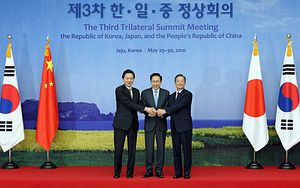South Korean President Park Geun-hye was in Beijing this week for China’s military parade, and for a meeting with Chinese President Xi Jinping. During their talks, South Korea’s Cheong Wa Dae revealed, Xi and Park agreed to hold a China-Japan-South Korea “trilateral summit in Korea at a mutually convenient date sometime at the end of October or the beginning of November.”
The announcement corresponds with previous reports that the three countries would hold a trilateral summit before the end of 2015. It will be the first such meeting since May 2012. Before that three-year gap, summits were held annually from 2008-2012.
While the announcement came after a bilateral meeting Park and Xi, Japan’s Chief Cabinet Secretary Yoshihide Suga suggested that Abe would be receptive. Japan “will continue communications with China and South Korea and work out a specific timing and venue,” Suga said, according to Kyodo News. He added that the leaders would likely discuss environmental issues and disaster risk reduction, as well as regional issues like North Korea’s nuclear program.
Japanese media also reported that the first official bilateral meeting between Abe and Park will take place on the sidelines of the trilateral summit. Such bilateral pairings are customary on the sidelines of the trilateral forum, and Suga said Abe “would be happy to receive an offer” for bilateral talks with South Korea. Kyodo News expects historical problems (including the Japan-South Korea friction over the “comfort women” issue) to be on the agenda in addition to more security-minded issues.
The Korea Herald noted that holding a trilateral summit allowed South Korea to make progress on Japan relations “in a way that least offends South Koreans who still resent the neighboring country for its brutal colonial rule from 1910-45.” Historical issues have been a sticking point in the South Korea-Japan relationship since Park came to office, and negotiations on a solution to the “comfort women” issue have made little progress.
While media reports suggest that Xi will take part in the summit, all the previous iterations saw China represented by its prime minister (Wen Jiabao, at the time), not by its president. That implies that Li Keqiang, not Xi, would travel to Seoul for the summit — unless Beijing wants to give the dialogue mechanism an upgrade through Xi’s presence.

































